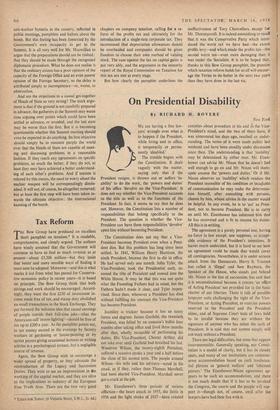On Presidential Disability
By RICHARD H. ROVERE New York
WE are having a fine law- yers' wrangle over what is to happen if the President, while living and in office, is temporarily or perma- nently 'disabled.'
The trouble begins with the Constitution. It deals vaguely with the matter, saying only that if the President resigns, is thrown out or suffers 'in- ability' to do the work, the 'powers and duties' of his office 'devolve on the Vice-President.' It does not say whether the Vice-President succeeds to the title as well as to the functions of the President. In fact, it seems to say that he does not. However, the Constitution lists a number of responsibilities that belong specifically to the President. The question is whether the Vice- President can have these responsibilities 'devolve' upon him without becoming President.
The Constitution does not say that a Vice- President becomes President even when a Presi- dent dies. But this problem has long since been settled. In 1841, William Henry Harrison, the ninth President, became the first to die in office. He had served only one month. John Tyler, the Vice-President, took the Presidential oath, as- sumed the title of President and moved into the White House. It may be that this was not quite what the Founding Fathers had in mind, but the Fathers hadn't made it clear, and Tyler impro- vised. Since then, whenever a President has died without fulfilling his contract the Vice-President has become President.
Inability is trickier because it has so many forms and degrees. James Garfield, the twentieth President, was felled by an assassin's bullet four months after taking office and lived three months after that, wholly incapable of performing his duties. His Vice-President, Chester Arthur, did not take over until Garfield had breathed his last. Woodrow Wilson, the twenty-eighth President, suffered a massive stroke a year and a half before the close of his second term. The people around Wilson—his wife and his advisers—acted in his stead, as if they, rather than Thomas Marshall, had been elected Vice-President. Marshall never got a crack at the job.
Mr. Eisenhower's three periods of serious affliction—the heart attack in 1955, the ileitis in 1956 and the light stroke of 1957—have created anxieties about procedure in his and in the Vice- President's mind, and the two of them 'have, it was announced ten days ago, reached an under- standing. The terms of it were made public last weekend and have been steadily under discussion since then. The understanding is that 'inability' may be determined by either man. Mr. Eisen- hower can advise Mr. Nixon that he doesn't feel well enough to go on and Mr. Nixon will there- upon assume the 'powers and duties.' Or if Mr. Nixon observes an 'inability' which renders the President insensible of his condition or incapable of communication he may make the determina- tion himself, after consulting with persons, chosen by him, whose advice in the matter would be helpful. In any event, he is to 'act' as Presi- dent, not to become President. He is to carry on until Mr. Eisenhower has informed-him that he has recovered and is fit to resume his duties. All this is in writing.
The agreement is a purely personal one, having no force in law except, one supposes, as accept- able evidence of the President's intentions. It leaves much undecided, but it is hard to see how an agreement could be made that would cover all contingencies. Nevertheless, it is under serious attack from the Democrats. Harry S. Truman has called it 'illegal' and Sam Rayburn, the Speaker of the House, who stands just behind Mr. Nixon in the line of succession, has said that it is unconstitutional because it creates 'an office of Acting President' not provided for in the basic charter of our liberties. There is talk of possible taxpayer suits challenging the right of the Vice- President, or Acting President, to exercise powers reserved to the President and the President alone, and of Supreme Court tests of laws held to be invalid because they are without the signature of anyone who has taken the oath of President. It is said that our system simply will not work without a President.
There are legal difficulties, but none that appear insurmountable. Generally speaking, our Consti- tution is a model of clarity, but it has its cloudy spots, and many of our institutions are common- sense accommodation based on such insubstan- tial phrases as 'general welfare' and 'inherent powers.' The Eisenhower-Nixon agreement ap- pears to be such an accommodation, and there is not much doubt that if it has to be invoked the Congress, the courts and the people will sup- port it—though not, of course, until after the lawyers have had their fun with it.


































 Previous page
Previous page